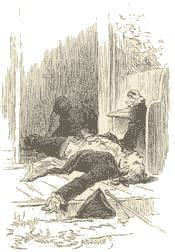James Otis was one of the most passionate and effective protectors of American rights during the 1760s, but his bright star dimmed during his lifetime and remains so today. He was born in West Barnstable on Cape Cod, the son of a prominent Massachusetts political figure with the same name. Young Otis graduated from Harvard College in 1743, practiced law briefly in Plymouth, and in 1750, settled in Boston, where he became a highly respected lawyer. At the beginning of his career, Otis was a political conservative and was rewarded for his loyalty in 1756, with an appointment as an advocate general in the vice admiralty court. Among his duties was the responsibility to prosecute smugglers. Many New England merchants had resorted to illegal activities in order to avoid the onerous Acts of Trade that governed commerce throughout the British Empire; the Crown attempted to crack down on the violators and had introduced a new legal instrument — the writs of assistance — to aid in the process. Those writs were general search warrants that enabled customs officials to enter business and homes in the hope of finding vaguely defined contraband. Many colonists, including Otis, were deeply concerned about what they regarded as an unconstitutional practice. Otis's conversion from a conservative royal employee to radical critic is not explained solely in terms of constitutional scruples. In 1761, the newly appointed governor of Massachusetts, Sir Francis Bernard, had selected Thomas Hutchinson to be the new Chief Justice of the colony’s Superior Court; the candidacy of James Otis Sr. was bypassed. Fueled both by principle and a desire for revenge, Otis resigned his position in 1761, and accepted a call from Boston merchants to represent them in a fight to prevent the renewal of authority for the Writs of Assistance. The case was heard in February and Otis, in the fashion of the day, delivered an eloquent five-hour argument in which he maintained that the writs were a violation of the colonists’ Natural Rights and that any act of Parliament that abrogated those rights was null and void. He stated in part:
A man’s house is his castle; and whilst he is quiet, he is as well guarded as a prince in his castle. This writ, if it should be declared legal, would totally annihilate this privilege. Custom-house officers may enter our houses when they please; we are commanded to permit their entry. Their menial servants may enter, may break locks, bars, and everything in their way; and whether they break through malice or revenge, no man, no court may inquire.In attendance at court that day was a young attorney, John Adams, who would later cite this moment as the first scene in the first act of resistance to oppressive British policies. Otis lost the case; the writs of assistance were renewed. However, the matter had been brought to popular attention and few officials in the future were willing to incur public wrath by employing the orders. Otis became an instant celebrity and a month later was elected to a seat in the General Court (legislature). As time passed and the list of American grievances against the Crown grew, Otis played an ever more prominent role in advancing the colonists' interests. In 1764, he headed the Massachusetts committee of correspondence. He also spoke and wrote widely, and won special praise for The Rights of the British Colonies Asserted and Proved, in which he made the case against Parliamentary taxation of the colonies. The following year he was a leading figure at the Stamp Act Congress in New York City. Otis’s open advocacy of American rights grated on many officials' nerves; his election to the speakership of the General Court in 1766, was voided by the governor’s veto. Undeterred, Otis teamed with Samuel Adams to confront the next crisis: enforcement of the Townshend Duties in 1767. The firebrand duo drafted a circular letter to enlist the other colonies in planned resistance to the new taxes.
 In 1769, at the height of his popularity and influence, Otis was pulled from the public stage. He had infuriated a Boston custom-house official with a vicious newspaper attack; the official beat Otis on his head with a cane. For the remainder of his life, Otis was subject to long bouts of mental instability. He was unable to participate in public affairs and spent most of his time wandering through the streets of Boston, enduring the taunts of a populace that had quickly forgotten his contributions. Otis was struck and killed by lightning in May 1783.
In 1769, at the height of his popularity and influence, Otis was pulled from the public stage. He had infuriated a Boston custom-house official with a vicious newspaper attack; the official beat Otis on his head with a cane. For the remainder of his life, Otis was subject to long bouts of mental instability. He was unable to participate in public affairs and spent most of his time wandering through the streets of Boston, enduring the taunts of a populace that had quickly forgotten his contributions. Otis was struck and killed by lightning in May 1783.